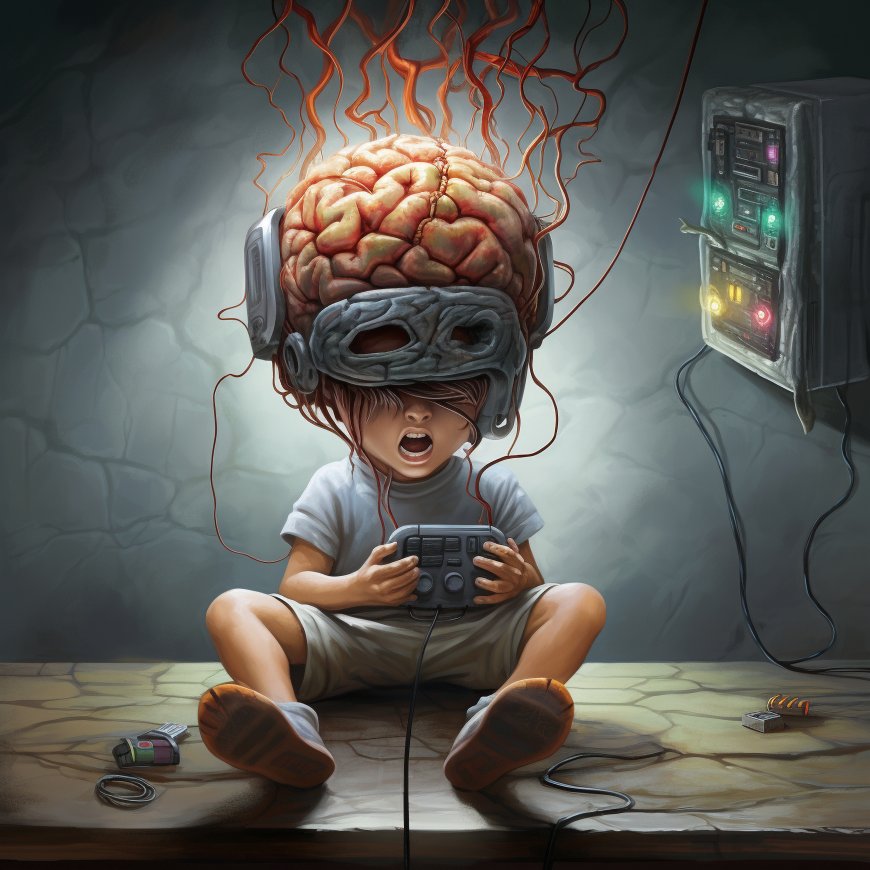The Negative Effects of Electronic Games on Mental Health
With the increasing popularity of electronic games, there is growing concern about their negative impact on individuals' health, particularly mental health. Here is a comprehensive look at the main negative effects of these games:

1. Addiction Effects:
Decrease in Sleep Time: It is observed that individuals who regularly play electronic games may suffer from sleep deprivation, as they spend long hours playing without paying attention to time.
Social Isolation: Deep immersion in electronic games may lead to the isolation of players from friends and family, affecting social relationships.
Negative Behavioral Changes: Addiction to electronic games can lead to negative behavioral changes such as eating disorders or mood swings.
Example: Players may find themselves spending entire nights in front of the screen without sleeping or interacting with friends and family.
2. Psychological Violence Effects:
Increase in Aggression Levels: Electronic games containing violent elements may increase players' levels of aggression.
Loss of Empathy: Electronic games may lead to a loss of empathy towards others' feelings, affecting personal relationships.
Reduction in Self-Esteem Levels: Players may experience frustration or psychological distress after repeated exposure to violence in electronic games.
Example: After playing a violent game for a long period, a player may find themselves more aggressive or less tolerant of difficult situations in daily life.
3. Psychological Pressure Effects:
Increase in Stress and Anxiety Levels: Electronic games may increase players' levels of stress and anxiety, especially in high-pressure in-game situations.
Difficulty in Managing Daily Pressures: Electronic games may make players less capable of dealing with daily challenges and problem-solving.
Decrease in Happiness and Satisfaction Levels: Psychological pressure from electronic games may lead to decreased levels of personal happiness and satisfaction.
Example: Players may experience constant anxiety or stress during difficult matches in the game, negatively affecting their mood and overall well-being.
4. Neglecting Health Effects:
Neglect of Physical Activities: Electronic games may make players less inclined to engage in physical activities, increasing the risk of chronic diseases.
Changes in Dietary Patterns: Addiction to electronic games may lead players to neglect healthy eating habits and prefer fast food and sugary drinks.
Increased Risks of Chronic Diseases: A sedentary lifestyle resulting from electronic games may increase the risk of obesity, heart disease, and diabetes.
Example: Players may sit for long periods in front of the screen without movement, increasing the risk of diseases due to an unhealthy lifestyle.
5. Academic Performance Effects:
Decline in Academic Performance: Spending excessive time playing electronic games may affect students' academic performance and achievements.
Loss of Interest in Studies: Addiction to electronic games may result in students ignoring school assignments and lessons.
Negative Impact on Academic Achievement: Overemphasis on electronic games may lead to a deterioration in students' academic achievements and reduced chances of academic success.
Example: Students may find themselves ignoring schoolwork and assignments due to excessive immersion in electronic games, negatively impacting their academic performance.
6. Effects on Personal Relationships:
Deterioration of Family Relationships: Electronic games may lead to a deterioration of family relationships due to reduced interaction among family members.
Disconnection from Friends: Addiction to electronic games may result in a disconnection from real-life friends and a preference for online communication only.
Increase in Emotional Conflicts: Electronic games may lead to an increase in emotional conflicts among family members or friends.
Example: Partners in a relationship may find themselves neglecting romantic activities or effective communication due to immersion in electronic games.
7. Physical Health Effects:
Increase in Neck and Back Problems: Electronic games requiring prolonged sitting in front of the screen may lead to an increase in neck and back problems.
Visual Impairment and Reduced Concentration: Electronic games may affect vision and concentration due to excessive immersion in the game.
Sleep and Digestive Disorders: Electronic games may cause sleep and digestive disorders due to stress and anxiety resulting from the game.
Example: Many players suffer from back and neck pain due to prolonged sitting in front of the screen, and they may also experience sleep problems due to stress from gaming.
8. Effects on Cognitive Development:
Negative Impact on Memory and Concentration: Electronic games may affect players' memory and concentration due to their distracted attention and excessive immersion in the game.
Reduction in Problem-Solving Skills: Players may rely on specific strategies within the game without the ability to apply them in real-life problem-solving situations.
Impact on Cognitive Development in Children and Adolescents: Electronic games may affect cognitive development in children and adolescents due to their influence on mental abilities, innovative thinking, and social interaction.
Example: Children may struggle to apply problem-solving skills learned in games to real-life situations, negatively affecting their cognitive abilities.
In conclusion, it is evident that electronic games can significantly impact individuals' mental health. Therefore, individuals should practice caution and moderation in playing electronic games, focusing on maintaining a healthy balance between gaming and other activities that promote mental and physical health.
What's Your Reaction?





































































































































































